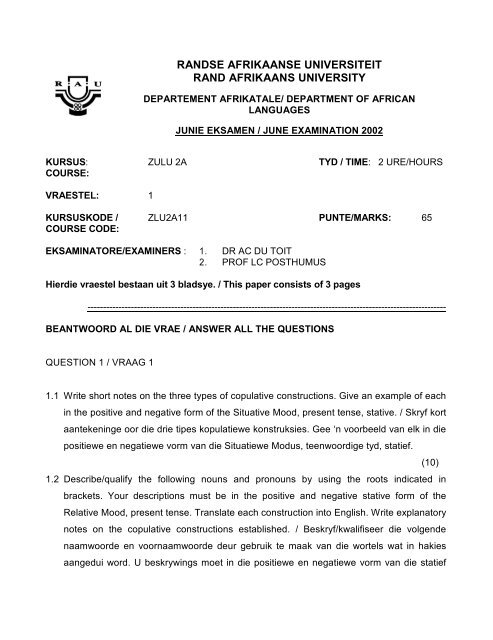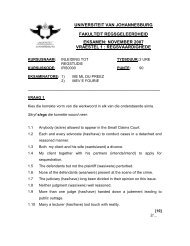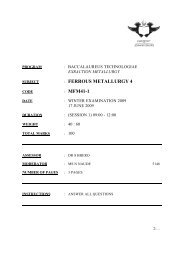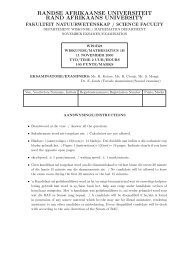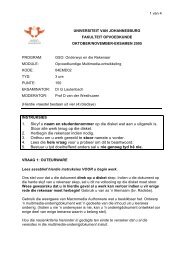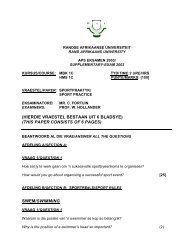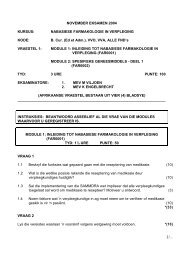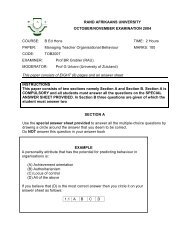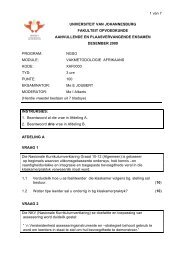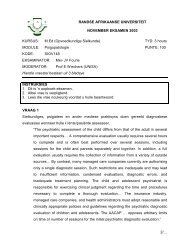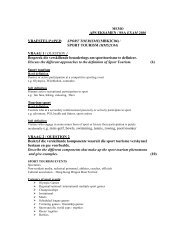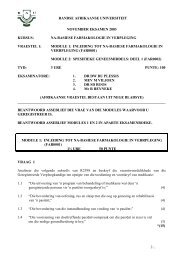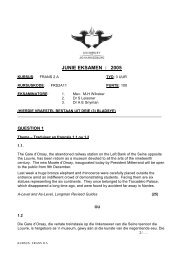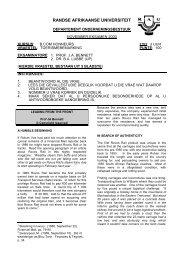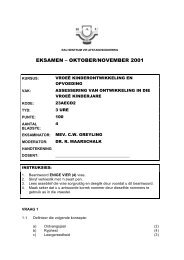randse afrikaanse universiteit rand afrikaans university
randse afrikaanse universiteit rand afrikaans university
randse afrikaanse universiteit rand afrikaans university
Create successful ePaper yourself
Turn your PDF publications into a flip-book with our unique Google optimized e-Paper software.
RANDSE AFRIKAANSE UNIVERSITEIT<br />
RAND AFRIKAANS UNIVERSITY<br />
DEPARTEMENT AFRIKATALE/ DEPARTMENT OF AFRICAN<br />
LANGUAGES<br />
JUNIE EKSAMEN / JUNE EXAMINATION 2002<br />
KURSUS: ZULU 2A TYD / TIME: 2 URE/HOURS<br />
COURSE:<br />
VRAESTEL: 1<br />
KURSUSKODE / ZLU2A11 PUNTE/MARKS: 65<br />
COURSE CODE:<br />
EKSAMINATORE/EXAMINERS : 1. DR AC DU TOIT<br />
2. PROF LC POSTHUMUS<br />
Hierdie vraestel bestaan uit 3 bladsye. / This paper consists of 3 pages<br />
--------------------------------------------------------------------------------------------------------------------<br />
BEANTWOORD AL DIE VRAE / ANSWER ALL THE QUESTIONS<br />
QUESTION 1 / VRAAG 1<br />
1.1 Write short notes on the three types of copulative constructions. Give an example of each<br />
in the positive and negative form of the Situative Mood, present tense, stative. / Skryf kort<br />
aantekeninge oor die drie tipes kopulatiewe konstruksies. Gee ‘n voorbeeld van elk in die<br />
positiewe en negatiewe vorm van die Situatiewe Modus, teenwoordige tyd, statief.<br />
1.2 Describe/qualify the following nouns and pronouns by using the roots indicated in<br />
brackets. Your descriptions must be in the positive and negative stative form of the<br />
Relative Mood, present tense. Translate each construction into English. Write explanatory<br />
notes on the copulative constructions established. / Beskryf/kwalifiseer die volgende<br />
naamwoorde en voornaamwoorde deur gebruik te maak van die wortels wat in hakies<br />
aangedui word. U beskrywings moet in die positiewe en negatiewe vorm van die statief<br />
(10)
2<br />
en in die Relatiewe modus, teenwoordige tyd wees. Vertaal dan elke konstruksie in<br />
Afrikaans. Skryf verduidelikende aantekeninge oor die kopulatiewe konstruksies wat u<br />
saamstel.<br />
1.2.1 umuntu (-dala)<br />
1.2.2 izingane (-b ili)<br />
1.2.3 izandla (-thathu)<br />
1.2.4 nina (-sha)<br />
1.2.5 mina (-fuphi)<br />
1.3.1 Differentiate between inchoative and stative copulative constructions. Give illustrative<br />
examples in the present tense of the Indicative mood. Tref ‘n onderskeid tussen<br />
inchoatiewe en statiewe kopulatiewe konstruksies. Lig u antwoord toe met voorbeelde<br />
in die teenwoordige tyd van die Indikatiewe modus.<br />
1.3.2 Motivate the statement: “The copulative verb stem -ba may be utilised in all four the<br />
non-tense distinguishing moods.” by using appropriate examples. / Motiveer die stelling:<br />
“Die kopulatiewe werkwoordstam kan in al vier die nie-tydonderskeidende modi gebruik<br />
word.” deur van gepaste voorbeelde gebruik te maak. (8)<br />
QUESTION 2 / VRAAG 2<br />
2.1 Motivate the statement: “The form of the possessive particle word is determined by the<br />
noun class of the possessor noun.” by using appropriate examples. / Motiveer die stelling:<br />
“Die vorm van die possessiewe partikelwoord word deur die naamwoordklas van die<br />
besitternaamwoord bepaal.” deur van gepaste voorbeelde gebruik te maak.<br />
2.2 Indicate, by using illustrative examples, that not all emphatic pronouns may function as<br />
possessive pronouns. / Gebruik gepaste voorbeelde om aan te dui dat alle emfatiese<br />
voornaamwoorde nie as besitlike voornaamwoorde gebruik kan word nie. (5)<br />
(20)<br />
(2)<br />
[40]<br />
(5)<br />
[10]
QUESTION 3 / VRAAG 3<br />
3<br />
Briefly discuss the morphological, syntactical and semantic characteristics of the exclusive<br />
quantitative pronoun. [5]<br />
QUESTION 4 / VRAAG 4<br />
Translate into Zulu / Vertaal in Zulu:<br />
4.1 If the leaves are turning brown, it is autumn. / As die blare bruin word, is dit herfs.<br />
4.2 All these lessons are easy. All of us shall pass. / Al hierdie lesse is maklik. Ons sal almal<br />
slaag.<br />
4.3 That dog is still young, it will not bite you. / Daardie hond is nog jonk, hy sal jou nie byt<br />
nie.<br />
4.4 The sun is not shining yet. Only the birds are awake. / Die son skyn nog nie, net die voëls<br />
is wakker.<br />
4.5 That boy will be brave one day. / Daardie seun sal eendag dapper wees.<br />
ooOoo<br />
[10]


